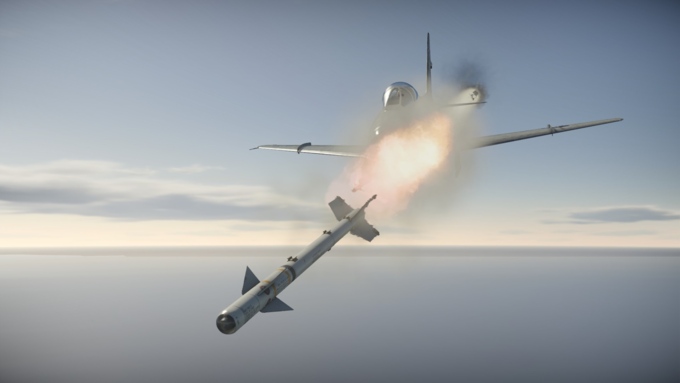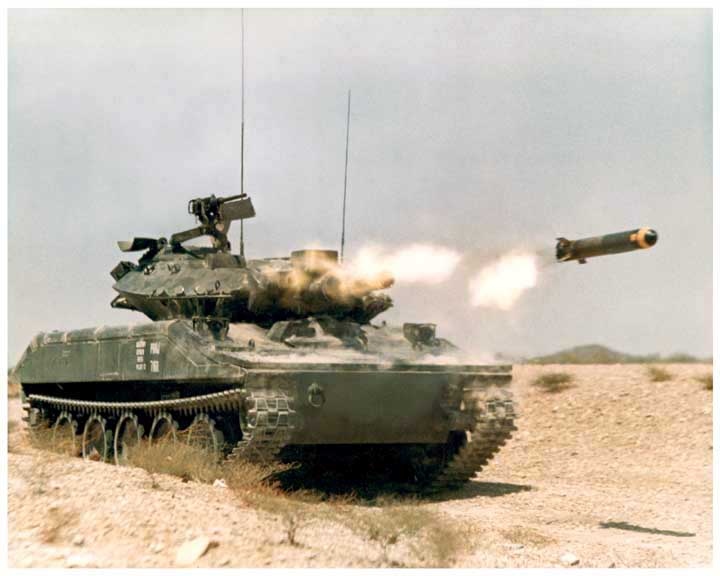Rockets & Missiles
There are various techniques you can use to avoid the different types of air-to-air missiles. As a general rule though, situational awareness is absolutely key, you should be looking out to see if any aircraft around you could have air-to-air missiles and judging what type they are likely to have. If an enemy is on your tail keep looking to see if a missile is launched. You may not get a visual warning (depending on missile type) and even if you do it may be too late.
Infrared (IR) homing missiles, also known as heat-seeking missiles, or heat-seekers, are the most widespread type of air-to-air missile in War Thunder. Infrared homing missiles have what is known as an IR seeker mounted in the nose of the missile. The IR seeker is capable of detecting the infrared light emitted by the target; and when the missile is launched the IR seeker tracks the source of infrared light and steers the missile towards it. These missiles are commonly called “heat-seekers”, as things which are hot emit large amounts of infrared light, so the missile is effectively looking for hot things to lock on to. Infrared homing missiles will lock on to any suitably strong infrared light source; this includes friendly aircraft (RB and SB) and the sun.
The Republic of China was one of the many nations to use surplus F-86 Sabre jet-fighters. The aircraft would engage in air combat with Chinese MiGs during the Taiwan Strait Crisis of 1958. Additionally, ROCAF Sabres were among the first aircraft to be equipped with AIM-9 Sidewinder missiles, which allowed them to compete against the superior performance of the Chinese MiG-17s. However, while the AIM-9's deployment was a considerable setback for the PLAAF, the situation changed when a Chinese MiG-17 returned to base with an unexploded AIM-9B lodged in its airframe. The missile was given to Soviet technicians, and subsequently reverse-engineered into the R-3 series of missiles.
The Ballistic Computer is a system found on some modern aircraft and helicopters used to aid the player in the delivery of unguided air-to-ground munitions. There are two key functions of the ballistic computer: Constantly Computed Impact Point (CCIP) and Constantly Computed Release Point (CCRP). CCIP continually calculates where munitions will land and gives the pilot an accurate impact point to aim with. CCRP allows the player to specify an impact point, the ballistic computer will then continually calculate at which point along the player’s flight path munitions will need to be released in order to hit the player’s designated impact point, and will only allow munitions to be released when that point is reached.
The new semi-active radar homing missiles operate with a signal that is continuously emitted by the radar of the player’s aircraft and reflected back from the target. Such tech grants the armament a series of advantages over heat-seeking infrared guided seekers Firstly, SARH missiles boast almost all-aspect capabilities, allowing the player to engage their enemy from practically any direction, and that includes blowing up right in their face – at this stage, heat-seeking guidance has zero purpose. For the very same reason, the launch range has been greatly boosted, meaning that the launch range is solely restricted by an aircraft’s radar coverage and the level of missile seeker sensitivity. And on many occasions, the launch range even exceeds the range of a visual contact with the target! Moreover, SARH missiles are not affected by the sun and can be launched even in heavily overcast conditions.




